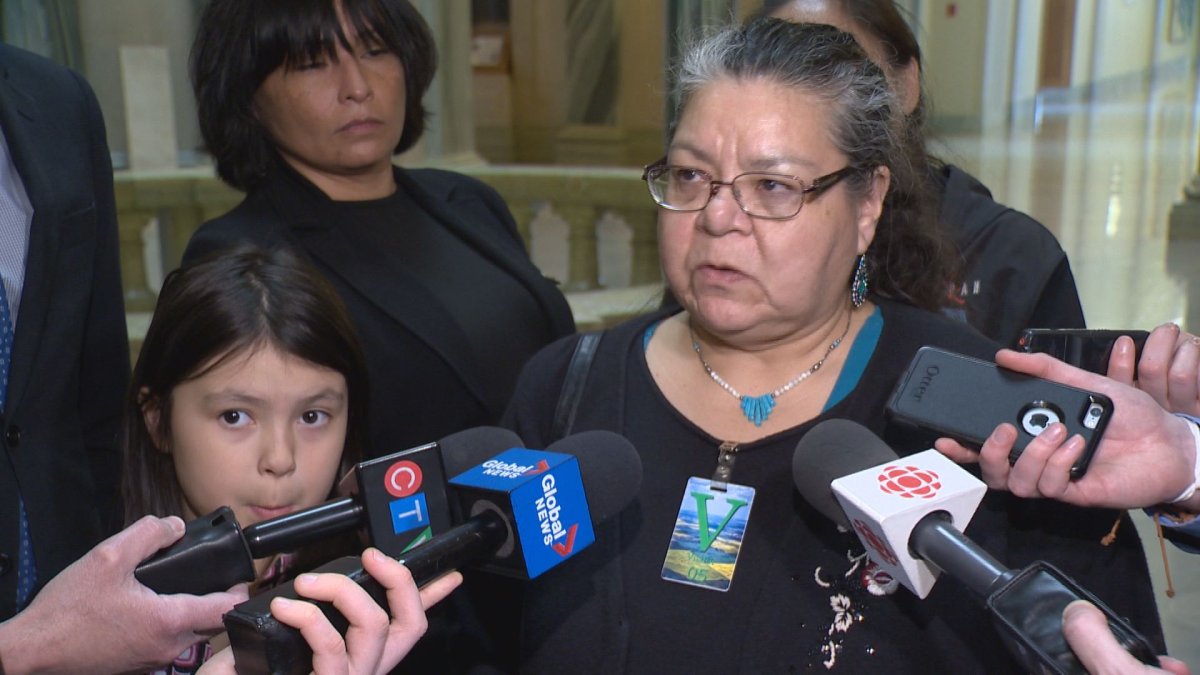A group of 60s Scoop survivors are calling on the provincial government to include ways to help with the healing process in their long promised apology for the scoop.

“We need time, healing takes time as well,” Laticia Racine, a 60s Scoop surivior said. “You have to acknowledge what you need to heal from, and then there are certain steps you need to do.”
Racine added that the province needs to consult with survivors on how best to deliver the apology.
“It needs to be done, and it needs to be a priority on their list,” she said.
Premier Scott Moe has said that he is committed to meeting with the Federation of Sovereign Indigenous Nations (FSIN) and Metis Nation to decide where and when an official apology will take place.
READ MORE: FSIN wants compensation to accompany Sask. ’60s Scoop apology
Last year, FSIN Chief Bobby Cameron floated the idea of compensation for survivors. This is something both Premier Brad Wall and Moe have said will not accompany an apology.
Racine said that money alone won’t heal the wounds she and her fellow survivors carry, but an apology should come with action. That action, healing programs designed in consultation with First Nations elders.
- ‘Shock and disbelief’ after Manitoba school trustee’s Indigenous comments
- Canadian man dies during Texas Ironman event. His widow wants answers as to why
- Several baby products have been recalled by Health Canada. Here’s the list
- ‘Sciatica was gone’: hospital performs robot-assisted spinal surgery in Canadian first
“I’m not sure how you’d be able to implement healing programs without money,” Racine said. “Programs around traditional culture, getting back to our language, getting our languages back and acknowledging that the Creator is first and that healing comes from him and from our land.”
Racine and her fellow survivors have similar stories of a loss of identity and growing up surrounded by racism.
Patricia Whitebear was taken from her mother at two-and-a-half years old. She was adopted by a family in the Bruno area. She said her adoptive parents were kind and she grew up in a good home. However, racism in the surrounding community drove her to take drastic action.
“I had always wore white shade of make-up, and tried to bleach my skin. I made myself sick trying to bleach my skin so they wouldn’t spit at and call me a useless squaw,” she said.
READ MORE: Regina ‘60s Scoop victims share their stories
She said that it was also very difficult to explain to her children why she doesn’t look like their grandparents.
Through the adoption process, another concern arose for Whitebear at the doctor’s office.
“I could not give my children a medical history. Do you know how hard that is when you don’t have your own medical history?” she said.
“When they get hurt and you don’t have a medical history to tell the doctors, their life gets put at risk.”
Moe said that he wants the apology to take place as soon as possible. He said there has been recent difficulties due to the Saskatchewan Party Leadership race and changing leadership among the Metis Nation.
“We’ve not offered compensation up to this point, we have, however, offered to engage with the FSIN, the Metis Nation, and our leaders across this province and I offer that again,” Moe said.
Premier Brad Wall first spoke of the 60s Scoop apology in 2015. The opposition NDP say that if the government holds this as a priority it would have been accomplished by now.
“We haven’t seen the government come to the table and look at what are all of the options,” Opposition Leader Ryan Meili said.
“Whether that is compensation for individuals, whether that’s investment in particular supports for healing, or whether it’s investments in making sure this doesn’t happen again.”
Between the 1960’s and 1980’s, thousands of First Nations and Metis children were taken from their home communities and adopted out by white families around the world.
READ MORE: ‘It’s a good first step’: Saskatoon ’60s Scoop survivor reacts to federal settlement
The federal government agreed to an $800 million settlement for Indigenous survivors of the scoop last October.
Saskatchewan 60s Scoop survivors will be holding a rally in Saskatoon Friday to share their stories and call for healing. Racine, Whitebear, and other members of their group will be meeting with the province in the near future.




Comments